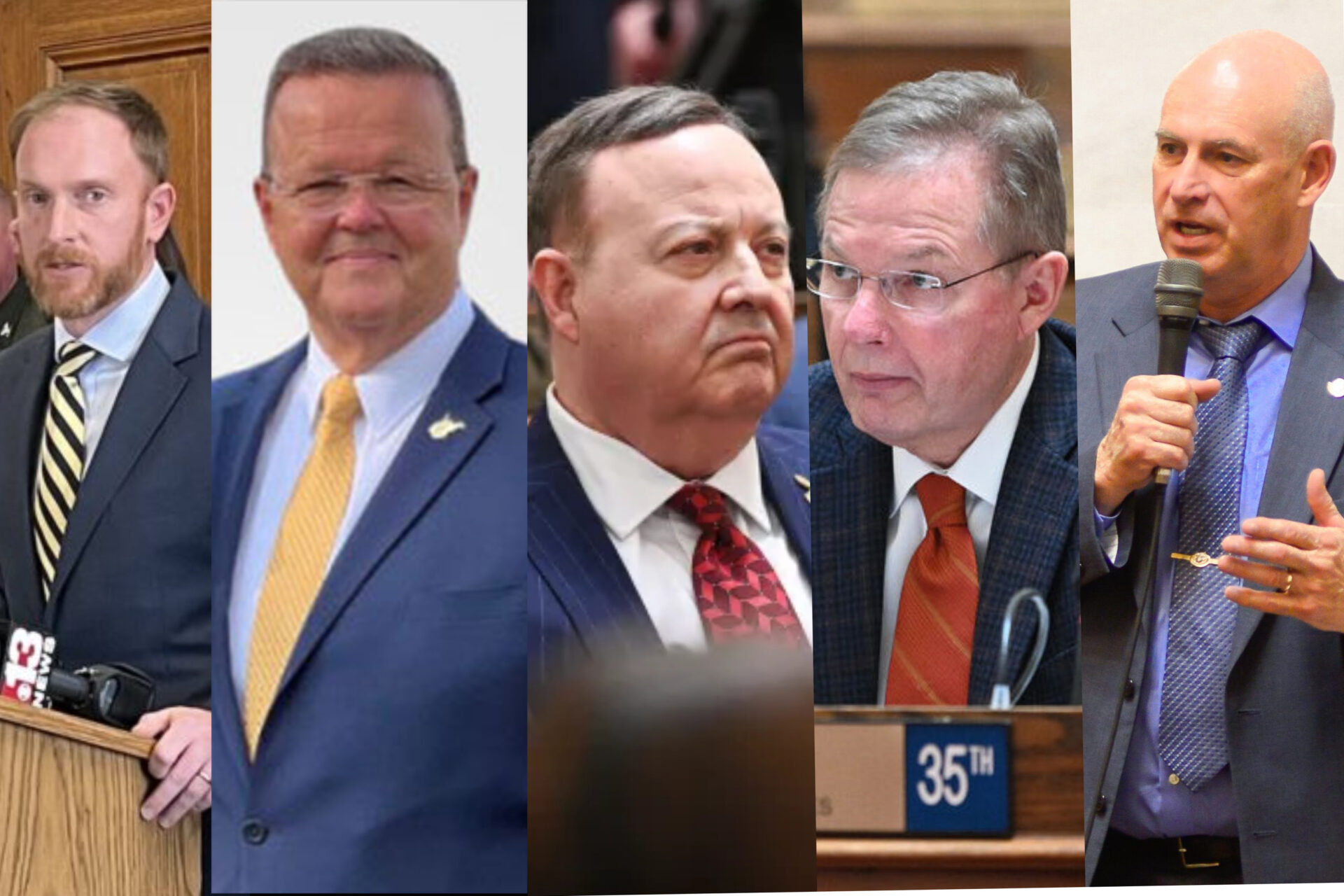Updated on Friday, Nov. 8, 2024 at 12:30 p.m.
This January, a new group of public officials will helm the West Virginia Board of Public Works, the state’s highest administrative body.
The board is comprised of six elected officers: the governor, attorney general, secretary of state, auditor, treasurer and agriculture commissioner. The state superintendent is also a board member, but is appointed by members of the West Virginia Board of Education — who are themselves appointed by the governor.
This year, all but one of the elected incumbents sought new government roles.
Board members play a key role in decision-making surrounding state property and public utilities, according to the West Virginia Humanities Council website. They may also coordinate policy efforts with the governor.
That is a role that will be assumed by current Attorney General Patrick Morrisey, who was endorsed by President-elect Donald Trump. He will assume the governorship this January after winning 62.1% of votes, according to unofficial results from the secretary of state’s office.
All newly elect members of the board are Republicans. West Virginia Public Broadcasting has compiled a list of the incoming officers who will help lead the state government alongside Morrisey.
Attorney General: J.B. McCuskey
Republican State Auditor J.B. McCuskey will take over for Morrisey as attorney general. He has held his current role since 2016, during which he launched a website publicizing state financial information. Previously, he represented Kanawha County in the West Virginia House of Delegates.
“What we see is that people from D.C. and New York and California don’t want family-centered, traditional value states that depend on natural resources for their economy to be successful,” McCuskey said ahead of his May primary. “You have unelected bureaucrats throughout the federal government, overstepping their legal and constitutional bounds, in order to fulfill political ideologies.”
McCuskey won against Democrat Teresa Toriseva with 70.18% of votes, according to unofficial results from the secretary of state’s office. Total contributions to McCuskey’s campaign amounted to nearly $1.5 million.
Thank you @Toriseva4AG – you ran a great race. I look forward to finding ways to work together to make all WVians lives better! https://t.co/1wB77qFi2r
— JB McCuskey (@mccuskeyforwv) November 6, 2024
Secretary of State: Kris Warner
Current Economic Development Authority Director Kris Warner will become the next secretary of state, taking over a role currently held by his brother, Mac Warner. Mac Warner leaves the seat after coming in fourth during the Republican gubernatorial primary.
“We face challenges from within our party, with individuals who do not share our beliefs,” Kris Warner’s Dec. 8, 2023 campaign launch read. “It’s crucial to stop these RINOs (Republicans in name only) from diluting our values and infiltrating our party.”
Kris Warner won against Democrat Thornton Cooper with 71.30% of the vote, according to unofficial results from the secretary of state’s office. Total contributions to Kris Warner’s campaign amounted to more than $182,000.
Auditor: Mark Hunt
Currently representing Kanawha County in the West Virginia Senate, Republican Mark Hunt will soon take McCuskey’s seat as state auditor.
Hunt unsuccessfully ran to represent West Virginia’s 2nd Congressional District as a Democrat in 2016, and lost a nonpartisan race for the West Virginia Supreme Court of Appeals in 2018.
Hunt’s campaign website outlines campaign goals of increasing government transparency, reducing fraud, stopping overreach and protecting tax dollars.
Hunt won against Democrat Mary Ann Claytor with 68.87% of votes, according to unofficial results from the secretary of state’s office. Total contributions to Hunt’s campaign amounted to nearly $90,000.
Treasurer: Larry Pack
Acting Secretary of the West Virginia Department of Revenue Larry Pack will advance to a more senior role as West Virginia’s chief financial officer after facing no Democratic opposition in this year’s race for state treasurer. He fills the role currently held by U.S. Representative-elect Riley Moore.
Decades before his name was on any ballot, Pack carved out an accounting and health entrepreneurship career in southern West Virginia. In 2020, he parlayed that experience into a spot on Kanawha County’s Republican ticket, and won a seat in the West Virginia House of Delegates.
His time in the West Virginia Legislature was cut short in 2022, when he stepped down to serve as a senior advisor to Gov. Jim Justice. Pack’s work with the governor’s administration secured his current appointment with the Department of Revenue in late 2023.
Pack’s platform included goals of reducing state spending, protecting the public pension system and promoting financial literacy, according to his campaign website. Pack also opposes investment decision-making based around environmental concerns, social issues and corporate governance.
Contributions to Pack’s campaign totaled more than $482,000.
Agriculture Commissioner: Kent Leonhardt
The only incumbent to remain on the board, Kent Leonhardt won re-election as the state’s agriculture commissioner for his third term. Leonhardt has expressed support for Morrisey.
Previously, Leonhardt represented Monongalia County as a state senator after retiring from the United States Marine Corps.
Thank you, West Virginia voters, for trusting me with a third term as your Commissioner of Agriculture! Together, let’s make this term our best yet and continue moving West Virginia agriculture forward!
— Kent Leonhardt (@KentforWV) November 6, 2024
His campaign focused on bolstering agricultural development and livestock production, while also expanding food access.
Leonhardt won against Democrat Deborah Stiles with 62.29% of the vote, according to unofficial results from the secretary of state’s office. Contributions to Leonhardt’s campaign totaled nearly $270,000.
Editor’s Note: This story was updated to include a photograph of incoming Secretary of State Kris Warner rather than the outgoing Sectary of State Mac Warner.
